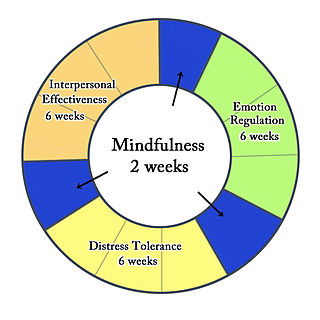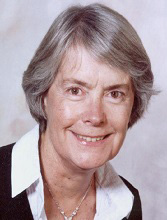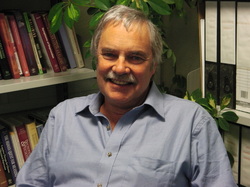
Cognitive behavioral therapy (CBT) is a psycho-social intervention that aims to reduce symptoms of various mental health conditions, primarily depression and anxiety disorders. CBT focuses on challenging and changing cognitive distortions and their associated behaviors to improve emotional regulation and develop personal coping strategies that target solving current problems. Though it was originally designed to treat depression, its uses have been expanded to include the treatment of many mental health conditions, including anxiety, substance use disorders, marital problems, and eating disorders. CBT includes a number of cognitive or behavioral psychotherapies that treat defined psychopathologies using evidence-based techniques and strategies.

Paradoxical intention (PI) is a psychotherapeutic technique used to treat recursive anxiety by repeatedly rehearsing the anxiety-inducing pattern of thought or behaviour, often with exaggeration and humor. Paradoxical intention has been shown to be effective in treating psychosomatic illnesses such as chronic insomnia, public speaking phobias, etc. by making patients do the opposite of their hyper-intended goal, hindering their ability to perform the activity.
Group psychotherapy or group therapy is a form of psychotherapy in which one or more therapists treat a small group of clients together as a group. The term can legitimately refer to any form of psychotherapy when delivered in a group format, including art therapy, cognitive behavioral therapy or interpersonal therapy, but it is usually applied to psychodynamic group therapy where the group context and group process is explicitly utilized as a mechanism of change by developing, exploring and examining interpersonal relationships within the group.

Dialectical behavior therapy (DBT) is an evidence-based psychotherapy that began with efforts to treat personality disorders and interpersonal conflicts. Evidence suggests that DBT can be useful in treating mood disorders and suicidal ideation, as well as for changing behavioral patterns such as self-harm and substance use. DBT evolved into a process in which the therapist and client work with acceptance and change-oriented strategies, and ultimately balance and synthesize them—comparable to the philosophical dialectical process of thesis and antithesis followed by synthesis.

The Institute of Psychiatry, Psychology and Neuroscience (IoPPN) is a research institution dedicated to discovering what causes mental illness and diseases of the brain. In addition, its aim is to help identify new treatments for them and ways to prevent them in the first place. The IoPPN is a faculty of King's College London, England, previously known as the Institute of Psychiatry (IoP).
Neuropsychiatry or Organic Psychiatry is a branch of medicine that deals with psychiatry as it relates to neurology, in an effort to understand and attribute behavior to the interaction of neurobiology and social psychology factors. Within neuropsychiatry, the mind is considered "as an emergent property of the brain", whereas other behavioral and neurological specialties might consider the two as separate entities. Neuropsychiatry preceded the current disciplines of psychiatry and neurology, which previously had common training, however, those disciplines have subsequently diverged and are typically practiced separately.
Medically unexplained physical symptoms are symptoms for which a treating physician or other healthcare providers have found no medical cause, or whose cause remains contested. In its strictest sense, the term simply means that the cause for the symptoms is unknown or disputed—there is no scientific consensus. Not all medically unexplained symptoms are influenced by identifiable psychological factors. However, in practice, most physicians and authors who use the term consider that the symptoms most likely arise from psychological causes. Typically, the possibility that MUPS are caused by prescription drugs or other drugs is ignored. It is estimated that between 15% and 30% of all primary care consultations are for medically unexplained symptoms. A large Canadian community survey revealed that the most common medically unexplained symptoms are musculoskeletal pain, ear, nose, and throat symptoms, abdominal pain and gastrointestinal symptoms, fatigue, and dizziness. The term MUPS can also be used to refer to syndromes whose etiology remains contested, including chronic fatigue syndrome, fibromyalgia, multiple chemical sensitivity and Gulf War illness.
Isaac Meyer Marks was born in Cape Town, South Africa. He trained in medicine there, qualifying in 1956. His training as a psychiatrist began in 1960 at the University of London and was completed in 1963. In 1971 he was a founder Member of the Royal College of Psychiatrists, and in 1976 he was elected a Fellow.
Treatment of chronic fatigue syndrome (CFS) is variable and uncertain, and the condition is primarily managed rather than cured.
Chronic fatigue syndrome (CFS) is an illness with a long history of controversy. Many professionals within the medical community do not recognize CFS as a genuine condition, nor is there agreement on its prevalence. There has been much disagreement over the pathophysiology of chronic fatigue syndrome, how it should be diagnosed, and how to treat it.
‘Functional disorder’ is an umbrella term for a group of recognisable medical conditions which are due to changes to the functioning of the systems of the body rather than due to a disease affecting the structure of the body.

Sir Simon Charles Wessely is a British psychiatrist. He is Regius Professor of Psychiatry at the Institute of Psychiatry, King's College London and head of its department of psychological medicine, vice dean for academic psychiatry, teaching and training at the Institute of Psychiatry, as well as Director of the King's Centre for Military Health Research. He is also honorary consultant psychiatrist at King's College Hospital and the Maudsley Hospital, as well as civilian consultant advisor in psychiatry to the British Army. He was knighted in the 2013 New Year Honours for services to military healthcare and to psychological medicine. From 2014 to 2017, he was the elected president of the Royal College of Psychiatrists.

Chronic fatigue syndrome (CFS), also called myalgic encephalomyelitis (ME) or ME/CFS, is a complex, debilitating, long-term medical condition. The causes and mechanisms of the disease are not fully understood. Distinguishing core symptoms are lengthy exacerbations or flare-ups of the illness following ordinary minor physical or mental activity, known as post-exertional malaise (PEM); greatly diminished capacity to accomplish tasks that were routine before the illness; and sleep disturbances. Orthostatic intolerance and cognitive dysfunction are also diagnostic. Frequently and variably, other common symptoms occur involving numerous body systems, and chronic pain is common. The unexplained and often incapacitating fatigue in CFS is different from that caused by normal strenuous ongoing exertion, is not significantly relieved by rest, and is not due to a previous medical condition. Diagnosis is based on the person's symptoms because no confirmed diagnostic test is available.

Gerhard Andersson is a Swedish psychologist, psychotherapist and Professor of clinical psychology at Linköping University. He was previously affiliated researcher at Karolinska Institutet. He was a co-recipient of the Nordic Medical Prize in 2014.

Rona Moss-Morris is Head of Health Psychology and Chair in Psychology as Applied to Medicine at the Institute of Psychiatry, King's College London. Her research investigates long-term, medically unexplained disorders such as chronic fatigue syndrome (CFS) and irritable bowel syndrome (IBS). She joined the IoP in 2011 and presented an inaugural lecture entitled "Trials and tribulations: A journey towards integrated care for long term conditions."

Leone Ridsdale, is Professor of Neurology and General Practice at King's College London. Her research has focused on self-education and/or CBT therapy for people with headache, chronic fatigue and epilepsy. Her teaching focus was on developing education for medical students and graduates to improve neurology patient care in the community.

Paul Raymond Gilbert is a British clinical psychologist. Gilbert is the founder of compassion focused therapy (CFT), compassionate mind training (CMT) and author of books such as The Compassionate Mind: A New Approach to Life's Challenges and Overcoming Depression.
Metacognitive therapy (MCT) is a psychotherapy focused on modifying metacognitive beliefs that perpetuate states of worry, rumination and attention fixation. It was created by Adrian Wells based on an information processing model by Wells and Gerald Matthews. It is supported by scientific evidence from a large number of studies.
Victor Campbell Meyer, or Vic Meyer, was a British psychologist at the Middlesex Hospital Medical School of the University of London and has been called the father of behavioral case formulation, an approach toward understanding complex psychiatric problems using learning principles derived from scientific psychological research and uniquely adapted to the individual case by means of the experimental method as a way to develop an effective intervention regimen. Meyer is credited by the British Psychological Society for his influential work in creating case formulation along with three other innovators: Hans Eysenck, Monte B. Shapiro, and Ira Turkat. Turkat credited Meyer as the pioneer of the framework of what is generally known today as case formulation, a required core skill for all British practicing psychologists since 2011.

Marcantonio M. Spada is an Italian-British academic psychologist who has studied the role of metacognition in addictive behaviours and operationalised the constructs of "desire thinking" and the "COVID-19 anxiety syndrome". He is currently Professor of Addictive Behaviours and Mental Health and Dean of the School of Applied Sciences at London South Bank University. He is also editor-in-chief of Addictive Behaviors and associate editor of Clinical Psychology & Psychotherapy.











